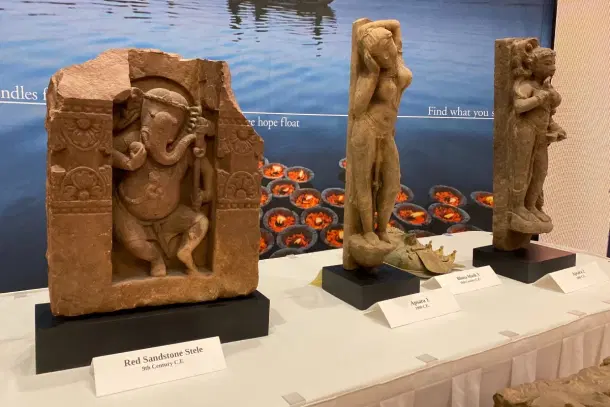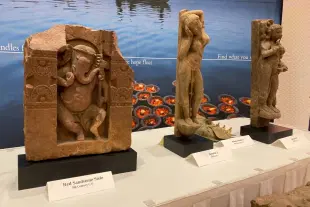Culture
Streamlined Repatriation: India-US Deal To Fast-Track Return Of Stolen Antiquities
Swarajya Staff
Nov 27, 2023, 03:40 PM | Updated Dec 14, 2023, 05:57 PM IST
Save & read from anywhere!
Bookmark stories for easy access on any device or the Swarajya app.


India is reportedly on the verge of finalising a deal with the United States that will significantly streamline the procedure for repatriating stolen antiquities.
Once the Cultural Property Agreement (CPA) is finalised, the US will automatically offer to return the antiquities without India needing to prove that the item belongs to it.
“We are eager to conclude a bilateral CPA, which would help to prevent illegal trafficking of cultural property from India to the US," a spokesperson for the US Embassy in New Delhi was quoted as saying by The Indian Express.
The spokesperson stated that the protection and return of cultural property is a priority for India and for the US, adding that they have been working closely with the Ministry of Culture and the Indian Embassy in Washington on this issue for close to two years.
The US follows a number of steps in line with its domestic law before finalising any agreement. When a nation submits a request for an agreement, it is evaluated by the Cultural Property Advisory Committee, appointed by the White House. This committee then forwards its recommendation to the State Department.
"The next step for India is to have its request considered before this Committee,” the spokesperson said.
During Prime Minister Narendra Modi's official visit to the US in June of this year, both nations agreed to collaborate on the agreement.
Over recent years, India has intensified its efforts to repatriate its heritage, a topic the Prime Minister has discussed with numerous global leaders and international institutions during his overseas trips. As per the governmental records, more than 400 antiquities have been returned to India since 2014.
"As per the agreement presently underway, the US will intercept smuggled goods at the border and return them expeditiously. Once it is implemented, the current process of repatriation will be simplified, and early return of antiquities will become possible. It is expected to come into effect in a few months," culture secretary Govind Mohan was quoted as saying in the IE report.
Encouraged by the progress made with the US, which has returned the most number of antiquities in recent years, India is now planning to establish similar agreements with multiple countries. These are nations where a significant amount of Indian art pieces are suspected to have been smuggled.
The agreement imposes import restrictions that stop looted and stolen cultural property from entering the US while encouraging the legal sharing of such objects for scientific, cultural, and educational purposes. The US also prioritises stopping trafficking of art objects to “eliminate key sources of funding for terrorists and transnational organised crime”.
“When objects are seized and forfeited under import restrictions created by the CPAs, there is a simplified process for returning objects to the partner country. The partner country does not have to prove the item is theirs. Rather, the United States automatically offers it to them for return,” the US Embassy spokesperson said.
Currently, when an artifact from India is found in a foreign country, its origin must be confirmed using documents like FIRs and visual proof. The Archaeological Survey of India (ASI), which is responsible for all antiquities, then verifies these objects in the host country before they are permitted to be returned to India.
A team of experts from the ASI travels to the country and verifies the items “on the basis of their knowledge, iconography and wear-and-tear marks”, according to an ASI official cited in the IE report.
However, there is no specific duration for this process.
An ASI team was recently in Singapore to verify a number of Chola bronzes that were stolen from India.
Additionally, an ASI team is expected to visit the US to authenticate a collection of 1414 items that were presented to India by the US, after determining their Indian origin.
When the agreement comes into effect, the usually lengthy verification phase can often be eliminated in many cases. According to the US official, they connect their law enforcement personnel with subject matter experts - archaeologists, curators, and conservators - who help identify cultural property pursuant to official investigations.
In the past twenty years, the United States has returned over 20,000 artifacts to over 40 countries and institutions. These returned items encompass a range of works such as paintings, sarcophagi, statues, coins, and illuminated manuscripts. Specifically, within the last four years, India has successfully retrieved around 400 antiquities that were smuggled or stolen from its territory and ended up in the US.
The United States maintains 25 ongoing bilateral cultural property agreements with countries such as Afghanistan, China, Cambodia, Egypt, Greece, Italy, Jordan, and Turkey. Although these agreements do not specify a timeline for the return of items, the procedure is typically efficient and expedited compared to alternative methods.
Every agreement implements import limitations customised to the requirements of the partner nation and steered by the definitions of archaeological and ethnological materials outlined in the Convention on Cultural Property Implementation Act.
The spokesperson from the US Embassy stated that since 2017, there has been a two-fold increase in the number of countries that have or are requesting such agreements.
Secretary Mohan revealed that India is actively seeking agreements for the repatriation of antiquities via both bilateral and multilateral channels. He expressed optimism that, following the US's acceptance of such a framework, other nations might also consider a similar, if not identical, approach.





